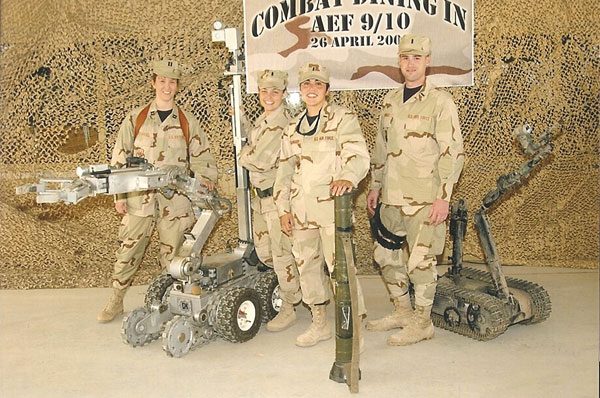Lesbian vets reflect on their service in the closet and in a post-Don’t Ask, Don’t Tell world.
Kathy Borkoski’s parents were both career Navy vets, so her own service seemed a given.
Terra Lathrop felt aimless in college and joined the Navy for a sense of purpose and to have an adventure. Eva Belanger saw a high school friend in an Air Force uniform and felt inspired to sign up herself.
These women were just like many other volunteers for the armed services, eager to wear a uniform and be part of a team. They were just like everyone else—except for one thing.
“I didn’t figure it out until I was already in,” says Borkoski. “By then I’d signed the paperwork promising that I wouldn’t be gay.”
“I didn’t realize how strict the policy was,” says Lathrop. “I had to learn to re-closet myself all over again.”
“When I first enlisted, it wasn’t something I realized,” says Belanger. “I was two years in before I started to wonder. But losing my career was just not something I was willing to risk.”
All three of these women are veterans, all three served in Iraq under the shadow of Don’t Ask, Don’t Tell, and all three came home to face a different challenge: finally being honest about who they are after careers of secrecy.
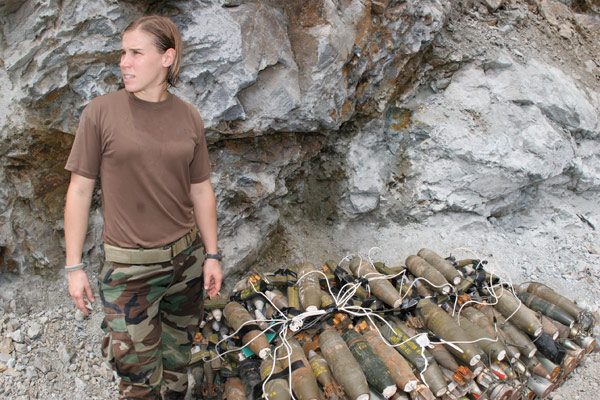
For Borkoski, the realization that she was gay couldn’t have come at a worse time. She was following in the footsteps of her mother and father, both Navy vets who served until retirement. At first, the agreement regarding her sexual orientation seemed like just one more piece of paper. It wasn’t until later that she realized she’d become contractually obligated to live a lie. “It’s difficult anyway to be figuring yourself out,” she says, “but then to have that looming over your head [makes it harder].”
Serving with a secret took its toll. “You have people that are always asking you, ‘What did you do this weekend?’ Since all my weekends were wrapped up with a girlfriend, I couldn’t tell them. It was difficult to always be telling half-truths.” In an environment where you’re trained to trust the people you work with implicitly, to be forced to keep them at arm’s length creates a tremendous strain. This while Borkoski served as a bomb disposal tech in Iraq at a time when she estimates there were a hundred bomb-related calls every day across the country.
Eventually Borkoski came out to a few team members.
They kept her secret, but there was always an element of risk on both sides of that decision. “I chose never to verbally tell anyone because I didn’t want my friends to have to lie,” says fellow Navy vet Terra Lathrop. After years of serving together, Lathrop’s other Naval search-and-rescue divers couldn’t help but realize that there were things she wasn’t telling them, but the truth had to remain unspoken.
“Pretty much anywhere I went I was the only female diver,” she says. “I was constantly surrounded by dominant males, so I had to walk this fine line of being able to hold my own, but not seem too strong and confident, because that would make me seem like a dykey female.”
For years, Lathrop was part of a team, but in some ways she had to be a woman apart. That proved difficult even for someone who jumps out of helicopters to retrieve half-drowned people for a living. “You’re always lying,” she says, “and there’s guilt that goes with that. You feel ashamed. A lot of what the military is about is integrity. You’re constantly talking about what it means to be honorable, but there’s a glass ceiling to that, because you’re constantly lying. You feel like, I’m so proud of my service, but my service isn’t proud of me.”
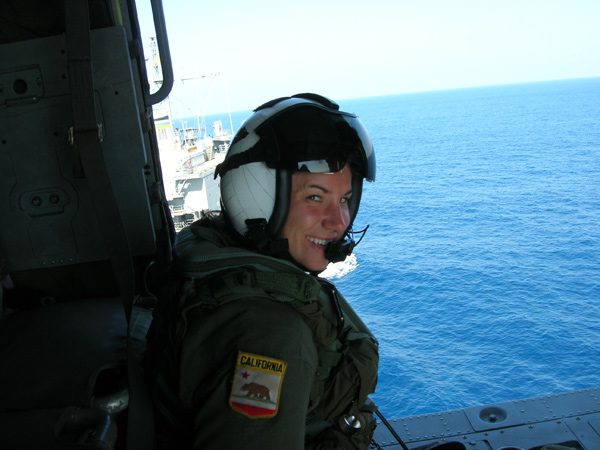
It was particularly hard for Lathrop to lie about her sexuality after having been open about it in her civilian life. She knew about Don’t Ask, Don’t Tell when she signed up but didn’t realize how far it went: Even speculation that she was gay could be enough to out her in the eyes of the Navy. “Someone just perceiving what they thought they knew was enough,” Lathrop says. “Perception is everything.”
A 2003 pamphlet from the Servicemembers Legal Defense Network, a nonprofit that provided legal counsel to American soldiers in danger of discharge under Don’t Ask, Don’t Tell, elaborates on the many dangers of being outed: “As the law has come to be implemented, there is no privacy for service members. If a military commander finds out that a service member has confided their sexual orientation to anyone—even parents, a psychologist or chaplain—the service member will likely face discharge.”
It goes on to warn that once outed it was “virtually impossible” for a soldier to deny it or defend themselves against the charge. Don’t Ask, Don’t Tell was so strict that it even included provisions against gay marriage even though not a single state allowed it at the time the legislation was written.
Lathrop says the cautionary tales about how easy it was to be outed were true: A woman she supervised in basic training wrote a letter to their commanding officer speculating that Lathrop was a lesbian (Lathrop insists it was a lucky guess). The CO buried the complaint but cautioned Lathrop that unfounded rumor, once put into writing, could end her career.
Lathrop and Borkoski had a lot of hurdles, but Air Force vet Eva Belanger had it even worse. Even when she realized she was a lesbian, Belanger couldn’t accept it. “I thought I could make myself not gay,” she says, “and I worked at it for years.” Belanger couldn’t reconcile her Christian faith with her emerging sexuality. Everything in her life—from her upbringing to her religion to her career in the military—told her that this was something she couldn’t be. “I had grown up Christian and I was and am very strong in my faith,” she says. “Those things made it very difficult for me to come out. You consider just not wanting to be around because it’s so painful and you don’t know where to fit in.”
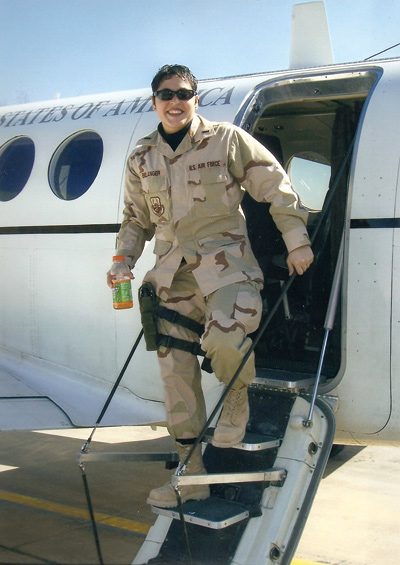
Belanger had to go all the way to Iraq for a breakthrough. There she experienced sectarian warfare and daily mortar attacks. At one point a falling bomb blew her clear across a room. Faced with the constant threat of death, Belanger had to take a hard look at her faith, her life and herself. “Being blown up a couple times, you start to think about what really matters,” she says.
So what’s scarier, going to war or coming out? “For me, coming out was scarier,” Belanger says, noting that she’d been trained for war and had a vast infrastructure to support her in it, but had nothing to rely on when she came out except the hope of goodwill. The first person she told was a fellow officer, who not only accepted her but helped her reconcile her religious conflicts. “She told me, ‘God loves you just the way you are.’ She was completely accepting and loving,” Belanger says.
By the time President Obama dissolved the ban on open service, Belanger had already left the Air Force. “I wanted to be me,” she says.” I felt that the higher I was going in rank, and with where we were with Don’t Ask, Don’t Tell, the secrecy, having secrets, it’s just painful. I didn’t want to do that any more.” Would she have stayed if she’d known the ban would be repealed? Maybe, she says. “But that wasn’t in the cards at that time.”
Lathrop eventually had her fill of secrecy too. Though proud of her service, she wanted out of the Navy and out of the culture of secrecy. Her superiors, excited to think how far their only female rescue diver might go, all but begged her to stay. “My chief was like, What are you doing, you have the perfect career, why would you leave? And I said, Because I could never have a family. I can’t even be in a relationship because I can’t get email with their name on it.”
Some dangled the pending repeal as an incentive to stay (like almost everyone she served with, Lathrop’s immediate superiors put two and two together about her sexuality long ago), but Lathrop didn’t buy it. “You don’t get a whole lot of current news in Iraq,” she says. “I had heard that the repeal was on the table, but when I came back it hadn’t been voted on yet. I honestly never thought that it would get repealed, I didn’t.”
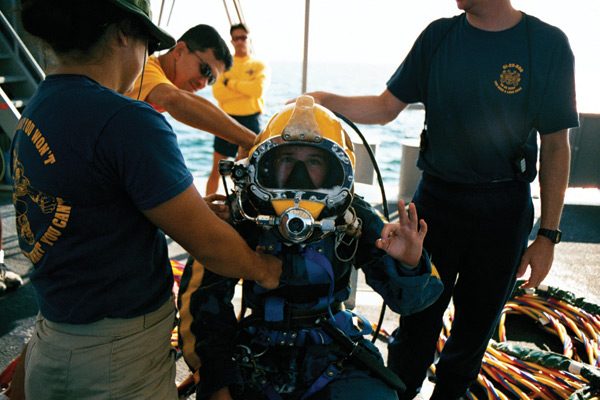
Borkoski alone experienced the transition to a post-Don’t Ask, Don’t Tell military. “I led a relatively open military life, [but] it was great when I could finally come out to my guys,” she says. “The very first week people came up to me and asked, Hey, how is your girlfriend? Everyone was kind of breathing a sigh of relief that they could actually [acknowledge it].” Borkoski eventually transitioned from active duty to reserves. But although all three of these women had more or less returned to civilian life by 2012, their service was still not quite finished.
This year the White House put out a call for videos about “unsung heroes” in the gay community for Pride month. Lathrop, Belanger and Borkoski all appeared in Just Like You, a video produced by the Military Acceptance Project (MAP, a nonprofit aimed at promoting diversity in the armed services) highlighting the careers of gay service members. In July, all three joined the rest of the MAP crew at special function at the White House honoring their accomplishments. When gay service members were able to walk the halls of power openly after spending their careers in the shadows, it was a big day.
“Watching the emotion on the faces of each of those featured in our video as it was played during the ceremony” was a profound moment for John “Jasper” Kump of MAP. “These are people who have protected my freedom for years while not being free themselves.”
Borkoski is still a reservist. She worked as a stuntwoman for two years after quitting active duty, but now wants a quieter life and thinks about starting a family. Family is the reason that Lathrop left the Navy too. She wants to finish college and settle down herself. Belanger is putting the lessons she learned on the long, hard road to accepting her sexuality and coping with the challenges of Post Traumatic Stress Disorder to good use as a councilor for other veterans. She’s finally comfortable and happy with who she is.
Despite what Just Like You says, these women were not, in fact, just like any other soldiers. They all had many extra miles to go. But now that they are secure in the knowledge that future recruits can serve openly, they really can afford to feel just like everyone else. Finally.
